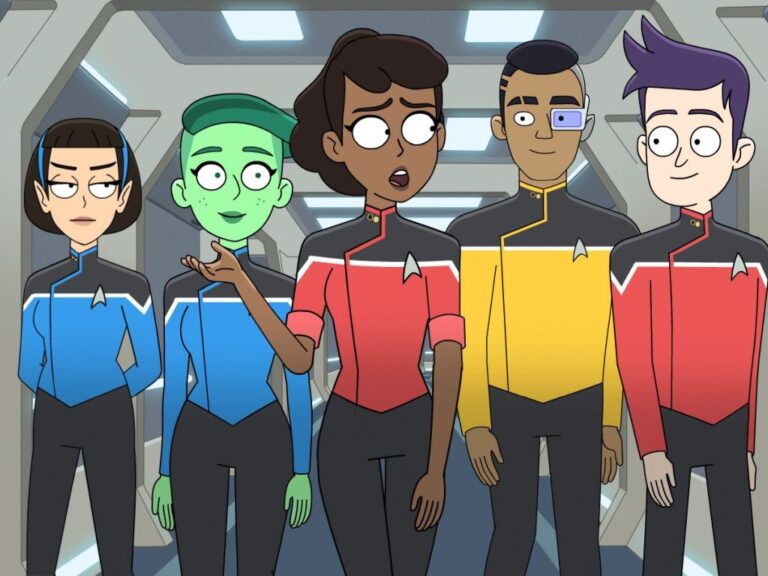Lower Decks’ third-season finale seemed to set the program up for a bright new future that truly evolved where the series was going, but the fourth season was an excellent course correction. Thus, you can only imagine how shocked we were to find that season five of the animated series would be the final, as was the Trek fandom.
At least there’s good news: the show is ending with much of the momentum it built up during the previous season. However, it also reminds us of a crucial lesson that any Starfleet officer should learn: change is strengthened by sticking to your core principles.
Here’s the clip released at NY Comic Con: Lieutenants Junior Grade Mariner (Tawny Newsome), Boimler (Jack Quaid), Rutherford (Eugene Cordero), and T’Lyn (Gabrielle Ruiz) adeptly navigate their careers on the second-lowest rung of the Starfleet career ladder in the first five episodes of Lower Decks’ ten-episode fifth season. Encouraged by the faith the audience had in each of them after the previous season, it honestly seems like a testament to the progress made by the show that these characters have grown up enough to be considered the next generation of Starfleet’s best while also feeling like they have matured in ways that make them feel like the crazy antics they can still get up to in the Star Trek galaxy.
Boimler and Mariner still have an excellent, hilarious relationship. Still, they also know when to be serious and when to be exemplary role models for the ensigns who are now beneath them. It’s a fine line that the show masterfully walks. Rutherford, left feeling a little lost after his best friend Tendi (Noël Wells) unexpectedly decided to leave Starfleet and rejoin her Orion family crime syndicate at the end of the previous season, has thrown himself into an unhealthy work-life balance. Meanwhile, T’Lyn’s cold Vulcan exterior has gradually warmed as she grows comfortable with her friends. They’re still inherently the same characters, but they feel mature in how they handle themselves and, most crucially when to acknowledge that they’ve messed up or have something they still need to work on.
This motif recurs throughout the first five episodes, following the USS Cerritos on various strange, appropriately bizarre adventures. At the same time, they carry out the routine tasks of plugging interdimensional “space potholes,” a distinctly Star Trek task that is not particularly glamorous. It allows the show to explore riffs on many fantastic Star Trek concepts, from the dangers of alien grey goo and parallel worlds to the repercussions of a society joining the Federation and descending into a post-scarcity, post-capitalist existence. It also allows Lower Decks to go deeper into its corners of Star Trek lore, revisiting previously touched-up characters and locations and bringing them to new and exciting heights. Potholes are about as far as it gets, and even that is handled lightly as an excuse for the Cerritos traveling from one end of the galaxy to the other. This season, there isn’t a particularly compelling season arc rumbling under the surface like there was with season four and the mystery of the disappearing ships. Instead, a key lesson for our developing heroes unites all the episodes thematically. Regardless of how far they have come in the four seasons of the show, it will always be crucial for them to be genuinely open and listen to one another and to share their doubts and concerns with their fellow officers and each other as friends. The show has already discussed this idea, particularly the power struggles that arise when senior and subordinate personnel on a starship cannot communicate. But it works well to revisit it at this point in Lower Decks’ journey when its characters clearly show signs of development and adulthood. Not only does the series seem to be reminding us and its heroes alike of lessons they will always need to re-learn as their careers progress, but it also feels like doing new things and taking on new responsibilities is just as important to them becoming the officers they want to be. It’s a mirror of a show that has undergone a similar process of learning and relearning, developing its own identity as a Star Trek program (while retaining its amiable readiness to make fun of the show and the brand), and gaining self-assurance as it goes along. Early in the season, not everything in this process of relearning quite clicks. It’s not spoiler to say that Tendi’s time with her sister and the politics of the Orion syndicates are resolved relatively early on in the season with little in the way of meaningful consequence—especially since we’ve seen her in trailers wearing a Starfleet uniform again. Lower Decks still has a penchant for setting up a big change for its status quo at the end of one season, only to largely undo it early on in the next. Although it is now a frequent irritation in the series, it feels quite harmless in this instance: It’s not like Tendi misses out since she still has a role to play in the conceptual teachings being taught to her friends back in Starfleet even before she is reunited with them. However, that serves as another indication of the progress made throughout Star Trek: Lower Decks. It is still, in many ways, the silly, fun Trek riff that made us fall in love with it when it first started. However, it has evolved and matured since then to the point where, even at its weakest, it is still attempting to say something honest and heartfelt about the characters it has come to represent and the universe it so much admires being a part of. With a record that would make any Starfleet officer proud, Lower Decks is leaving with a bang if the second half of the season lives up to these lessons in maturity.
Paramount+ will debut two episodes of the fifth and final season of Star Trek: Lower Decks on Thursday, October 26.
Are you looking forward to the final season of Star Trek: Lower Deck?
Note: Some links may lead to an approved affiliate, and small proceeds from the sale will go to support the blog. Thank you!


